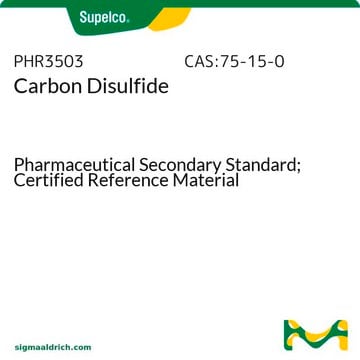About This Item
Recommended Products
vapor density
2.67 (vs air)
Quality Level
vapor pressure
19.48 psi ( 55 °C)
Assay
≥99.9%
form
liquid
autoignition temp.
212 °F
expl. lim.
50 %
technique(s)
HPLC: suitable
impurities
≤0.03% water
evapn. residue
<0.0005%
refractive index
n20/D 1.627 (lit.)
bp
46 °C (lit.)
mp
−112-−111 °C (lit.)
density
1.266 g/mL at 25 °C (lit.)
λ
H2O reference
UV absorption
λ: 386 nm Amax: ≤1.0
λ: 388 nm Amax: 0.50
λ: 394 nm Amax: 0.25
λ: 403 nm Amax: 0.10
λ: 410 nm Amax: 0.05
λ: 500-750 nm Amax: 0.01
application(s)
food and beverages
SMILES string
S=C=S
InChI
1S/CS2/c2-1-3
InChI key
QGJOPFRUJISHPQ-UHFFFAOYSA-N
Looking for similar products? Visit Product Comparison Guide
General description
Application
Used as a solvent/reagent to extract:
- Ethylbenzene, indan, indene and acenaphthene in air samples prior to capillary gas chromatography analysis with flame ionization detection (GC-FID)
- Hydrocarbons in air prior to GC-MS
related product
Signal Word
Danger
Hazard Statements
Precautionary Statements
Hazard Classifications
Acute Tox. 4 Inhalation - Eye Irrit. 2 - Flam. Liq. 2 - Repr. 2 - Skin Irrit. 2 - STOT RE 1
Target Organs
Peripheral nervous system,Central nervous system,Cardio-vascular system,Eyes
Storage Class Code
3 - Flammable liquids
WGK
WGK 2
Flash Point(F)
-22.0 °F - closed cup
Flash Point(C)
-30 °C - closed cup
Certificates of Analysis (COA)
Search for Certificates of Analysis (COA) by entering the products Lot/Batch Number. Lot and Batch Numbers can be found on a product’s label following the words ‘Lot’ or ‘Batch’.
Already Own This Product?
Find documentation for the products that you have recently purchased in the Document Library.
Customers Also Viewed
Our team of scientists has experience in all areas of research including Life Science, Material Science, Chemical Synthesis, Chromatography, Analytical and many others.
Contact Technical Service







